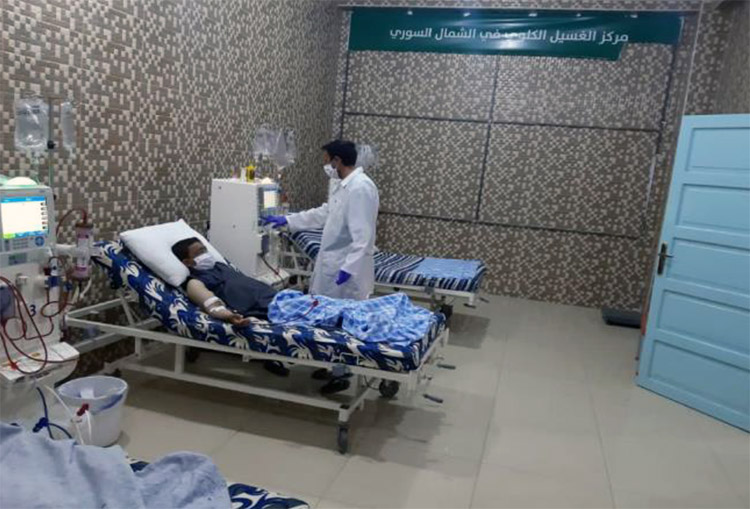
16 October 2021- Generated in response to the coordination needs between the multiple NGOs managing dialysis units in northwest Syria, WHO’s Dialysis Taskforce was established by the Health Cluster as an emergency project with Johns Hopkins University, Baltimore, USA, to analyze long-standing deficiencies, problems and challenges in hemodialysis units in the area, and develop and implement a series of activities to improve the quality of services for patients.
Health services in northwest Syria suffer from a lack of staff, equipment, medicine and consumables, as well as funding for operational and running costs. While maintaining access to general primary and secondary healthcare is the main objective of the humanitarian response, providing access to specialized healthcare -- especially for chronic conditions -- remains the principal challenge in a continuously changing context.
An estimated 600 patients, at least, receive hemodialysis treatment in northwest Syria. A variety of NGOs run 14 dialysis units with limited supervision from specialists. Five additional units operate in the Turkish-controlled areas to the northeast. While WHO provides kits, medicines and technical supplies to many of these NGOs at an estimated cost of $1.5 million a year, some are presented by NGO individual donors, while others still arrive through the Consolidated Appeal Process (CAP). The supplies delivered to WHO are rapidly passed to the NGOs, who store them in their warehouses in Syria.
Reports have detailed that the human and material resource capacity in dialysis units are limited, physical infrastructure is lacking, and major problems with infection control are common. Minimum defined standards for supply, process, and quality of care for dialysis units are lacking. Furthermore, the unit locations and consequent distances limit patient access.
The findings of assessments conducted by the Dialysis Taskforce on dialysis needs/services in the Idlib and Aleppo governorates in 2019 and 2020 revealed high levels of viral infections, lack of infection prevention and control (IPC) measures and minimum quality standards in practice.
The data collection process is ongoing for the quality improvement assessment. A technical team of two doctors from Johns Hopkins University arrived to Gaziantep on 16 October, 2021 to support in analyzing the data and present the results at a workshop.
Recommendations found were the need for centering on creating a series of standards appropriate to northwest Syria in the areas of patient, care, laboratory testing, record keeping, and equipment maintenance which will define the function of hemodialysis units under circumstances specific to the area. A strong emphasis in these standards will be IPC, consistent with the WHO hospital IPC standards.
WHO Gaziantep extends its gratitude to all workshop attendees, particularly to Dr Gilbert and Dr Samee of Johns Hopkins University, Baltimore, USA.
For more information, please contact:
Grattan Lynch
Communications Officer
E-mail:
This e-mail address is being protected from spambots. You need JavaScript enabled to view it




